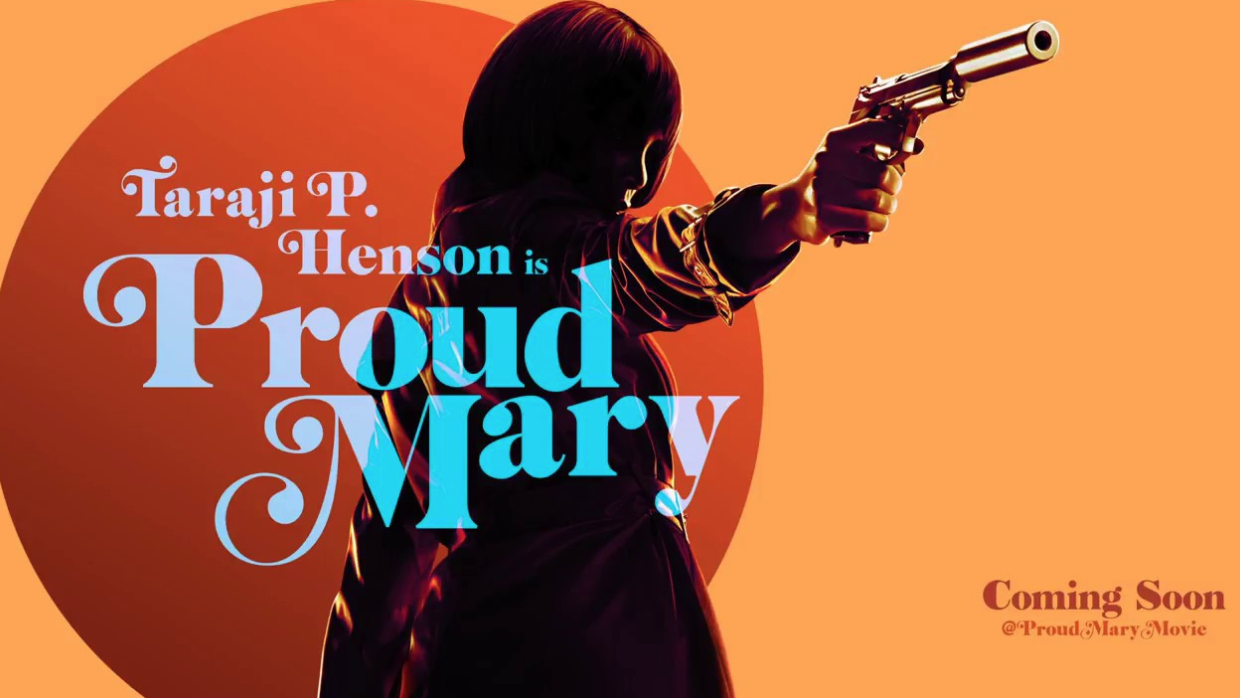Whenever the story of a hit man makes its way onto the screen, there is automatically a built-in audience. For all of us are fascinated–whether subtly or overtly–with a lifestyle filled with such danger, cold-bloodedness, and a high untaxed pay grade. Part of us wonders, could we do it–if we really had to, and the circumstances conspired to lead us down that path? The answer, likely, is no. Which is why we prefer to live vicariously through the hit men of the cinema. But rarer than the portrayal of the hit man is the portrayal of the hit woman. Least of all the black hit woman. As a response to that lack, we now, unfortunately, have Proud Mary. Directed by Babak Najafi and written by John S. Newman (if you don’t recognize the names, there is, perhaps, a reason), an opportunity to at last imbue the tale of the “hit person” with a fresh and more multi-layered angle was presented only to have the mark egregiously missed.
Like those characters who have come before her in this prototype, Mary (Taraji P. Henson, grossly under used for her talents in this project) is a loner, though she is part of a “family.” Specifically one of the most powerful organized crime ones in all of Boston. For some reason, because there is a black woman in the lead role, Najafi finds it necessary to include 70s retro-inspired titles as “Papa Was A Rollin’ Stone” plays during the intro. The non sequitur nature of this stylistic choice–used for no other reason except to possibly give us hope that we might be seeing something as good as a Pam Greer movie–is the first indication of just how much Proud Mary wants to touch on specific points to ensure that it is deemed worthy of the rare and coveted hit woman genre. In its cluttered rush and frantic scramble, the slapdash script comes across as a faint montage of gunfire, Greek tragedy and maybe a little bit The Pelican Brief (mainly because of this one specific running scene “filled with intrigue”). And also, most obviously, Luc Besson’s Léon: The Professional.
In a similar vein to Léon (the inimitable Jean Reno), Mary is met with the unexpected feeling of responsibility for a child not her own. In lieu of orphaned Matilda (Natalie Portman), it is orphaned Danny (Jahi Di’Allo Winston, who you might recognized from the now canceled Netflix series Everything Sucks!). Except, in Mary’s case, she’s actually the cause of Danny’s lack of a parent. Feeling beholden to make amends for the father she ripped away too soon from him for the sake of her job, Mary tracks him over the course of a year to ensure he’s making it okay in the world. Of course he’s not. Has instead fallen prey to the crime underworld himself after becoming the, for all intents and purposes, indentured servant of “Uncle” (Xander Berkeley), a Russian crook (because, as Red Sparrow recently iterated, all Russians are diabolical) accordingly protected by the Russian mob, a.k.a. the warring faction against Mary’s own “family,” run by Benny (Danny Glover). Danny’s son, Tom (Billy Brown), eager to carve out a name for himself, is champing at the bit to let the blood flow when Uncle is killed and the Russians start coming for them with the assumption that his death was at their hands.
In the meantime, Danny has settled in both nicely and reluctantly into Mary’s deluxe apartment. In the spirit of Matilda, equally as foul-mouthed, he wants to know everything about Mary’s life, most especially when she tries to conceal it. Despite his physical comforts, however, his emotional stress continues to get the better of him as he begins to unravel the truth about Mary’s profession. Just as Matilda did with Léon, he wants to be schooled in Mary’s hit woman ways so as to be able to defend himself, and her–should the situation require it. Mary, to be sure, is not interested in offering her tutelage in this way, herself wanting to break free from the family in order to start over again. Somewhere “warm” and doing something slightly more normal, or maybe nothing at all if her excess of cash should last long enough. In contrast to the more complex character of Léon, Mary isn’t driven by the tragedy of her past (running away as soon as she was able because her father was a dickhead and she then unwittingly replaced him with another dickhead in the form of Benny) so much as the expected maternal instinct that has suddenly kicked in with the appearance of Danny in her life. She might have been killing mercilessly all these years, but with the need to mother awakened in her, there is no turning back. One supposes this is somehow ultimately the indirect message of Proud Mary (apart from every lone wolf just wanting to connect with another lone wolf): each female just wants to nurture something–she can’t help it. Which is why Mary must break out of her long-time prison at any cost, even if it means betraying the very people she once thought had been her raison d’être. “I am the mothering type,” she declares, aiming a gun at Tom’s head. That being said, one thing about Proud Mary is definitely true: a woman will always choose a child over a man. That’s just the unspoken hit woman’s code. But it might have been at least subversive if the twist at the end of Proud Mary (of which there is none) had been for her to turn her back on the kid. Now that would have really paid homage to some fucked up Greek shit and carved out a place for it as the only hit person movie of its kind.



















